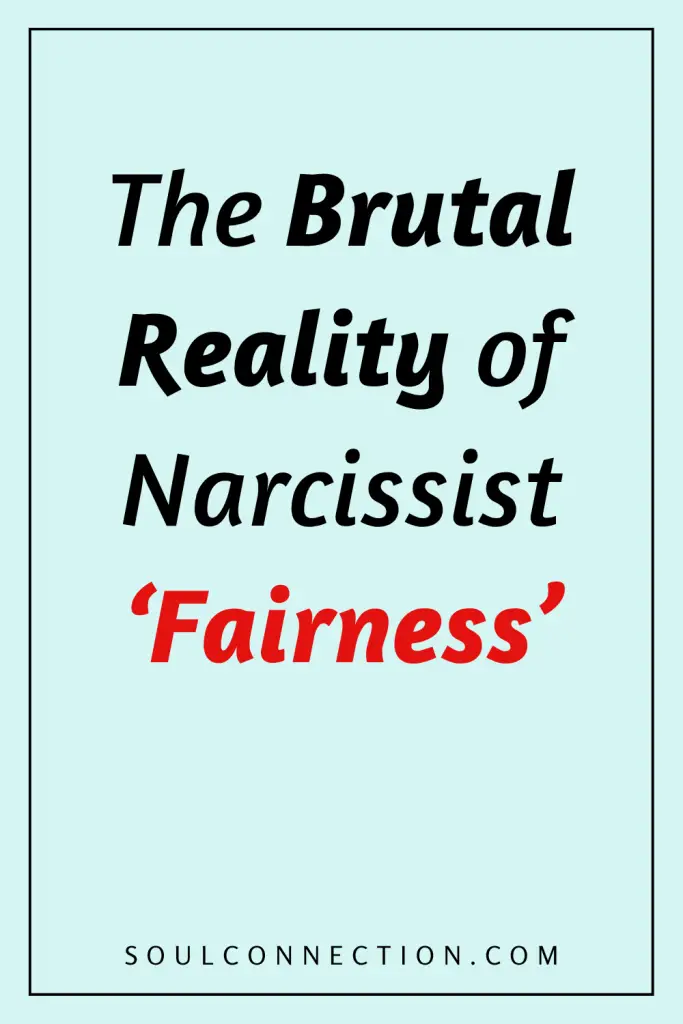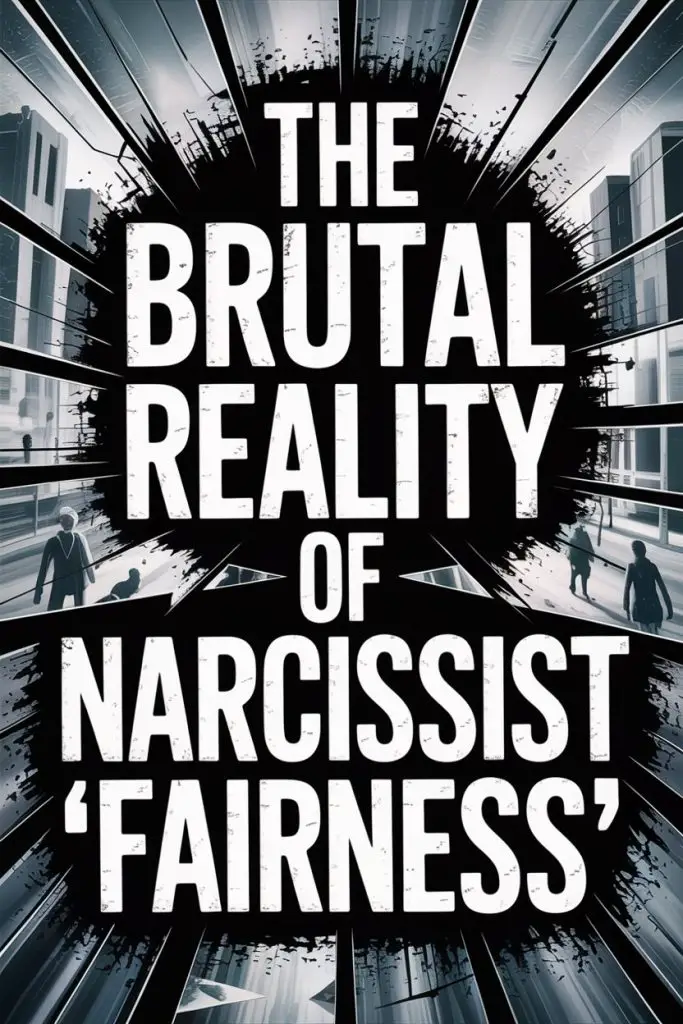When someone says, “That’s not fair!” it usually means a rule was broken, a line was crossed, or perhaps someone just lost at Monopoly.
In a healthy relationship, fairness suggests a give-and-take, mutual respect, and, occasionally, sharing the last slice of pizza.
But when you’re paired with a narcissist, fairness becomes a whole different beast—one that’s less about balance and more about keeping you off-balance.
Ready to sift through the smoke and mirrors? Straight talk ahead about how narcissists twist the very idea of fairness.
Whose Rules Are These, Anyway?
Narcissists are famous for their Olympic-level double standards. When they’re up, they want applause. When they’re down, you’re to blame.
Their definition of fairness changes more often than the British weather.
In a disagreement, these rules work only in one direction: theirs. If you forget an anniversary, you’re insensitive. If they forget, it’s because you didn’t remind them.
If you voice your needs, you’re needy. If they do, it’s self-care. The same action earns you a scolding and them a standing ovation.
This one-way traffic turns every conversation into a minefield, where you’re forever guessing which version of “fair” you’re meant to follow today.
Scorekeeping: The Never-Ending Game
Ever felt like your partner keeps a mental spreadsheet of every mistake you’ve ever made? Narcissists are the reigning champions at this game, but they use a rigged calculator.
Your slip-ups go on the permanent record—sometimes brought up with laser precision months (or years) later. Meanwhile, anything they do wrong is wiped clean, “forgotten,” or rebranded as “your fault.”
If you try to point out the discrepancy, you’ll get an eye roll and a fresh round of gaslighting.
The goalposts for fairness keep moving, and you’re always the one chasing after them.
Fairness as a Weapon
When a narcissist talks about fairness, it’s usually because they’re not getting their way. Suddenly, “fair” means “I should win.”
Prepare for passionate lectures about how much they sacrifice, how little you appreciate them, and how you’re obviously the villain of the story.
They’ll use your sense of fairness against you, too. Say you want equal say in decisions? That’s selfish. Want to spend time with friends? How dare you not consider their feelings.
Watch as your requests for basic respect are spun into accusations of greed and ingratitude.
If you’re not careful, you’ll start believing them—and that’s when things get really messy.
Emotional IOUs and the Great Debt That Never Ends
In a healthy relationship, giving and receiving are pretty even. With a narcissist, you’re always in emotional debt.
Every little thing they do for you—whether it’s making a cup of tea or not slamming the door in your face—gets filed away as proof of their generosity.
Next time you need something? “Remember when I did X? You owe me.”
The scales are permanently tipped in their favour. If you ask for help or support, you’re reminded of your outstanding balance.
Ironically, any support you give them is quickly forgotten, or better yet, expected as the bare minimum.
Rewrite History? Absolutely!
Arguing with a narcissist about what’s fair is a bit like playing chess with a pigeon. No matter how logical your moves are, the pieces end up all over the place, and the pigeon struts around like it’s won.
Narcissists are world-class at rewriting history. “I never said that.” “You’re remembering it wrong.” “You’re too sensitive.”
Their version of events puts them in the role of the misunderstood hero—or, occasionally, the long-suffering martyr.
You question your memory, your sanity, and, eventually, your right to fairness at all. It’s exhausting, but that’s the point.
When Fairness Means Control
Fairness, in the narcissist’s dictionary, often means control. They want things “equal” when it benefits them, and “special” when it really counts (spoiler: it always counts for them).
You might notice rules change at lightning speed. One day you’re encouraged to go out with mates; the next, you’re guilt-tripped for not being home.
What’s fair one week is completely unacceptable the next.
This inconsistency isn’t random—it’s a way to make sure you’re always on your toes, always apologising, and always working just a bit harder to keep them happy.
The ‘Fair Fight’ That’s Never Fair
Relationship experts love to talk about “fair fighting.” But with a narcissist, arguments follow a script straight from the Twilight Zone.
Try expressing a concern, and suddenly you’re facing a barrage of unrelated accusations, wild exaggerations, and personal insults.
The subject changes so quickly, you’re left defending your entire existence.
If you apologise, it’s never enough. If you stand your ground, you’re accused of being combative. If you walk away, you “don’t care.”
The only winning move? Never play. But that’s easier said than done when you’re stuck in the thick of it.
Gaslighting: Fairness with a Twist
Gaslighting is the narcissist’s favourite party trick. When you call out unfairness, the response isn’t empathy but confusion.
“What are you talking about?” “You’re too emotional.” “You always make things about you.”
The aim: make you doubt your own sense of right and wrong. Suddenly, you’re apologising for things you haven’t done, or accepting blame for problems that aren’t yours.
The longer this goes on, the more your expectations shrink. What passes for “fair” in your relationship would be laughable on the outside, but feels normal when you’re living it.
Fairness Becomes a Moving Target
At some point, you realise that the rules of fairness are always shifting. Today’s “deal” isn’t tomorrow’s. Standards melt away as soon as you get close.
If you ever manage to call out the double standard, you’re met with wild justifications or flat denial.
You catch yourself working overtime to keep things smooth—anticipating moods, avoiding triggers, giving up your needs—all just to avoid another round of, well, “fairness.”
The exhaustion is real, and it’s meant to be.
How to Stop Playing in a Rigged Game
Wondering if you’re stuck in this never-ending circus? Chances are, if your partner’s idea of fairness always leaves you shortchanged, you might be.
Luckily, you don’t have to keep playing.
Try setting boundaries: clear, firm, and non-negotiable. Expect pushback—it’s practically guaranteed—but hold your ground.
Keep records if things get really gaslight-y. Maybe not a diary worthy of a Netflix thriller, but enough that you can check your own reality when things get blurry.
Reach out for support—from a mate, a counsellor, or even a support group. Narcissists keep you isolated for a reason: it makes their brand of “fairness” easier to sell. Don’t buy it.
And, if nothing changes? Permission to walk away. Fairness isn’t supposed to be a magic trick or a moving target.
What Real Fairness Looks Like
Fairness in a relationship means seeing each other as equals—both allowed to have needs, make mistakes, and ask for support.
It’s not always 50/50 (sometimes it’s 60/40, or 30/70, depending on whose day was worse), but it never leaves one person permanently in the red.
Real fairness feels like relief, not anxiety. It’s the peace of knowing that when you mess up, you’ll get a chance to make it right. When you succeed, someone’s genuinely happy for you—without a price tag attached.
If you’re not getting that, it’s not you—it’s the rules you’ve been handed.
Reclaiming Your Right to Fairness
Living with a narcissist’s version of fairness is a masterclass in self-doubt and self-sacrifice. But you can rewrite the rulebook.
Start by trusting your gut: if it feels unfair, it probably is. Give yourself permission to want more, expect more, and demand more.
The road back to real fairness might not be easy, but it is absolutely worth it.
And no, you’re not selfish or “too sensitive” for wanting it. You’re just ready to stop playing by rules that were never written for you.
Pass the last slice of pizza, and take your fair share. You’ve earned it.


